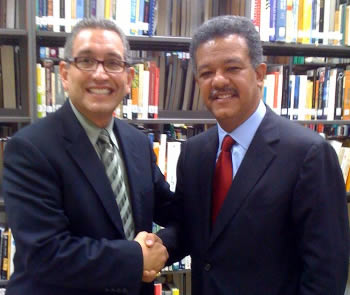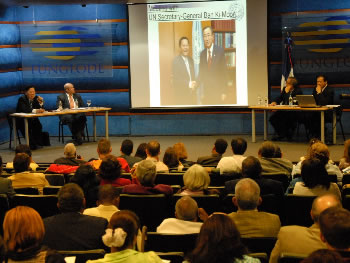Agreement Yields Computers for Students

COCONUT CREEK, Fla. (May 7, 2010) – Millions of students in the Caribbean and Latin America will gain access to computers after the signing of an agreement this week between Food For The Poor and the United Nations Information and Technology Corps (ITCO). The signing was part of “The Future of Technology & Education in Haiti and the Dominican Republic” conference in Santo Domingo, Dominican Republic.
Recognizing that education and technology are crucial to breaking the cycle of poverty, Food For The Poor has committed to placing an additional 40,000 computers in the 17 countries it serves. That translates to more than 2 million students being able to enter a world of technology that previously was closed to them.
“Technology breaks all barriers when it’s well-done, well-guided and well-used,” said Angel Aloma, Executive Director of Food For The Poor, at the conference. “These computers are tremendous dream machines that will help us feed more than the physical needs of children. These children exhibit great hunger for knowledge, and it is our duty to feed that hunger. Thank you for helping us become dream-makers.”
The conference was presented by Food For The Poor, The Infopoverty Institute and The Global Foundation for Democracy and Development (FunGlode), a foundation created by Leonel Fernandez, president of the D.R.

While President Fernandez was not able to attend the conference, he did meet privately with Aloma and the two discussed a possible collaboration of building homes for the poor. The meeting was arranged by Felix Bautista, president of the nonprofit group FUNDI, which works to alleviate poverty through education.
The Information and Technology Corps, also known as the 500/13 Initiative, has a goal of giving 500,000 computers to schools in 60 countries for the benefit of 33 million students by 2013. Dr. Paul Jhin is CEO of the corps.
The agreement between Food For The Poor and ITCO reads, in part: For each computer committed by ITCO to Food For The Poor, the charity will provide five additional monitors and will convert each donated CPU to make it capable of feeding Internet to six monitors/stations. This will increase the number of students who have access to the computers. For example, a donation of 300 computers would result in the installation of 1,800 computer stations that could independently access the Internet. When the number of students who will have access to the computers is factored, the number served reaches well into the millions.
Dr. Lee Pai-Po, Deputy Secretary General for the Taiwan ICDF, and Melanio Paredes, Minister of Education for the Dominican Republic, also made presentations to conference participants.
Former President Clinton could not attend the conference, but taped a video message that praised the public/private partnerships as a catalyst for collaboration.
“I want to thank President Fernandez, especially, for his leadership,” Clinton said. ” I commend Food For The Poor, which can help get computers into schools where they are needed most – in communities across the developing world.”
Food For The Poor, the largest international relief and development organization in the United States, does much more than feed millions of hungry poor in 17 countries of the Caribbean and Latin America. This interdenominational Christian agency provides emergency relief assistance, clean water, medicines, educational materials, homes, support for orphans and the aged, skills training and micro-enterprise development assistance, with more than 96 percent of all donations going directly to programs that help the poor. For more information, please visit www.foodforthepoor.org.
Contact:
Kathy Skipper
Director of Public Relations
954.427.2222, ext. 6614
[email protected]


